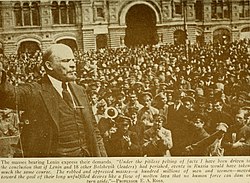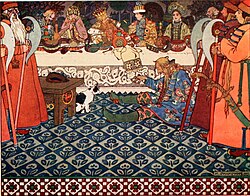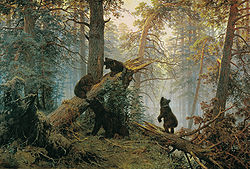See all articles relating to: Russia
Russians are an East Slavic ethnic group and the most populous population in Russia and Europe. They also form significant Russian communities in Kazakhstan, the United States, Germany, and other countries. The national language of Russians is Russian, which holds the status of an official language in Russia, Belarus, Kazakhstan, and Kyrgyzstan, and is widely spoken in other former Soviet Union countries. The majority of religiously affiliated Russians belong to the Eastern Orthodox Church.
The total number of Russians worldwide is approximately 133.5 million people. Of these, 105.6 million people reside in Russia (according to the 2021 census data), which accounts for 71.73% of the country's population.
Research your ancestors on MyHeritage
History of the Russian people

The history of Russia begins with the emergence of the Slavs, who appeared approximately 3,000 to 3,500 years ago, originating from the Indo-European ethnic group. From the middle of the 1st millennium BCE, they started migrating to Eastern Europe, settling in the basins of the Dnieper, Dniester, Western Dvina, Oka, and the upper Volga rivers by the 8th century CE.
The first state of the Russian people, Kievan Rus', existed for about 300 years. It was a federation of principalities jointly ruled by the Rurikid dynasty. The development of feudal relations and the growing independence of individual cities led to the political fragmentation of Kievan Rus'. In the late 1230s, the Mongol-Tatars invaded Russia, subjecting it to the rule of the Golden Horde for almost 250 years. Moscow emerged as the political leader in the early 14th century, attributed to its advantageous geographic position and the far-sighted policies of its princes.
The 17th and 18th centuries marked a new period in Russian history, during which, while maintaining the feudal order and even strengthening it, the formation of a capitalist system began. The era of Peter the Great became a time of significant transformations affecting all aspects of state and societal life. The main outcome was the transformation of the country into a maritime power, which significantly accelerated its development and secured a respectable position among European nations.
The reign of Catherine II is referred to as the "golden age of the nobility" and the "enlightened absolutism" because the empress completed the process of establishing the nobility as a privileged class. However, the position of the peasantry deteriorated significantly, with serfdom taking on traits of slavery.
By the beginning of 1812, a large part of Europe was under the influence of France. Russia and Great Britain remained the only countries posing a threat to Napoleon's plans. In 1812, Napoleon invaded Russia with forces that outnumbered the western Russian armies threefold, but within six months, his army, the strongest in history, was completely annihilated.
By the mid-19th century, serfdom in the country had worsened and intensified. Amid peasant uprisings, particularly during the Crimean War, the government, led by Alexander II, implemented a reform in 1862 that abolished serfdom.
In the years preceding World War I (1914-1917), Russia made a step to rapprochement with Great Britain, which resulted in the formation of the Entente - a "cordial agreement," a military-political alliance between England, France, and Russia and Russia's participation in the First World War.

The domestic political crisis, which resulted in the February Revolution of 1917, led to Russia's exit from the war. The revolution destroyed the old state system and created a new political situation. Power in Russia was seized by the Bolshevik Party under the leadership of Vladimir Lenin, and the supreme governing body was declared to be the Soviets of Workers', Soldiers', and Peasants' Deputies. On December 30, 1922, the Union of Soviet Socialist Republics (USSR) was formed.
After Lenin's death, Joseph Stalin came to power, establishing a dictatorship and eliminating all of his political rivals. In 1939, Russia signed a non-aggression pact with Germany, but on June 22, 1941, Nazi Germany invaded the USSR, violating the terms of the agreement. World War II claimed the lives of millions of Soviet citizens, and Stalinist repressions continued to decimate the country's population. Following Stalin's death in 1953, the era of Khrushchev's Thaw began. Nikita Khrushchev, the First Secretary of the Communist Party, debunked the cult of personality surrounding Stalin, implemented a series of democratic reforms, and conducted a mass rehabilitation of political prisoners. After Khrushchev's removal from power, the so-called era of stagnation -- a period characterized by a lack of significant upheavals in the country's political life.
In 1985, Mikhail Gorbachev announced a policy of perestroika (a set of political and economic reforms), which eventually led to the disintegration of the USSR by the early 1990s. On December 12, 1993, the Constitution of the Russian Federation was adopted through a referendum, declaring Russia as a democratic federative state with a republican form of government headed by a president.
Russian culture

In its development, Russian culture has gone through several stages:
- Pre-Christian, Pagan culture of the Eastern Slavs (approximately 3rd-10th centuries).
- Culture of Kievan Rus (11th-end of the 13th century).
- Culture of the Tatar period in Rus (end of the 13th-15th century).
- Culture of the Muscovite Tsardom (16th-17th centuries).
- Culture of Peter's Russia (late 17th-18th century).
- Culture of Imperial Russia (late 18th-early 20th century).
- Culture of Soviet Russia (late 20th century-early 1990s).
- Post-Soviet culture (since the early 1990s).
Russian Literature

Russian literature has reflected not only aesthetic, moral, and spiritual values and beliefs; according to leading Russian thinkers, literature is also the philosophy of Russia.
Until the 18th century, secular literature in Russia was practically nonexistent. There are several monuments of ancient Russian literature of a religious or chronicle nature, such as "The Tale of Bygone Years," "The Lay of Igor's Campaign," "The Prayer of Daniel the Exile," and "Zadonshchina." The folk creativity of that period is represented by the unique genre of epic poetry known as "byliny" and fairy tales.
In the 18th century, a constellation of secular writers and poets emerged in Russia. Among them were poets like Gavriil Derzhavin and Mikhail Lomonosov; writers such as Nikolay Karamzin, Denis Fonvizin. The dominant artistic style in literature at that time was classicism. It was only in the 19th century that a whole constellation of Russian writers emerged (Fyodor Dostoevsky, Alexander Pushkin, Leo Tolstoy, Ivan Turgenev, and others), who have become the hallmark of Russian classical culture.
Russian Art

In the second half of the 19th century, there was a flourishing of realistic painting in Russia. The creative association of Russian artists called the "Association of Traveling Art Exhibitions" (also known as the "Peredvizhniki" or "The Wanderers") was founded, which included such great artists as Victor Vasnetsov, Ivan Kramskoy, Mikhail Shishkin, Arkhip Kuindzhi, Vasiliy Surikov, Ilya Repin, and Aleksey Savrasov.
At the turn of the 19th and 20th centuries, there was the movement known as the "World of Art" association. Its members or artists closely associated with the movement included Mikhail Vrubel, Kuzma Petrov-Vodkin, Nikolai Roerich, and Isaac Levitan.
At the end of the 19th and the beginning of the 20th century, Russia became one of the centers of avant-garde art. Prominent representatives of the avant-garde movement included Vasily Kandinsky, Kazimir Malevich, Marc Chagall.
Russian Classical music
Russian classical music encompasses the creative legacy of great composers such as Pyotr Tchaikovsky, Mikhail Glinka, Nikolai Rimsky-Korsakov, the composers' group "The Mighty Handful," Sergei Rachmaninoff, and Igor Stravinsky. Among the Soviet composers, some of the most significant ones include Sergei Prokofiev, Dmitry Shostakovich, Aram Khachaturian, and Alfred Schnittke.
Russian Cuisine

No national cuisine demonstrates such a variety of soup types as Russian cuisine. There are seven main groups: cold soups based on kvass (such as tyurya, okroshka, and botvinya); vegetable soups with broth; meat, mushroom, and noodle soups; shchi (cabbage soup); soups based on sour-salty brine (rassolnik and solyanka); fish soups like ukha and kalya; and finally, soups made with grains or grain-vegetable bases.
At the very beginning of the 20th century, several authentic national dishes of Russian cuisine were included in the approved list of dishes of the pan-European restaurant cuisine by internationally recognized French chefs. These include shchi (cabbage soup), botvinya (sorrel soup), borscht, rassolnik (pickle soup), ukha (fish soup), solyanka (meat and vegetable soup), as well as pirozhki (stuffed pastries). These dishes, which have no counterparts in world cuisine, stand out in Russian national cuisine for their exceptional taste and culinary qualities.
Various pies with meat filling, pelmeni, and vareniki are extremely popular in Russian cuisine.
Russian language

The Russian language is widely spoken around the world, ranking eighth in terms of overall speakers and seventh in terms of native speakers. It is also the most commonly used language in Europe.
The vocabulary of the Russian language is primarily derived from its native roots. Early borrowings include words from Slavic, Greek, and Turkic origins. Later on, there was a prevalence of borrowings from Dutch, German, and French, and in more recent times, English borrowings have become prominent. Russian dialects can be categorized into two main groups: the northern and southern dialects.
The written form of the Russian language utilizes the Cyrillic script, which is based on the Old Slavonic writing system.
Explore more about Russian ethnicity
- Ethnicity map of Russia on MyHeritage
- Russia. Collection of records on MyHeritage
- Russian Christmas and tradition on MyHeritage blog
- Zooming In on a Stunningly Hi-Res Photo from Imperial Russia on MyHeritage blog


